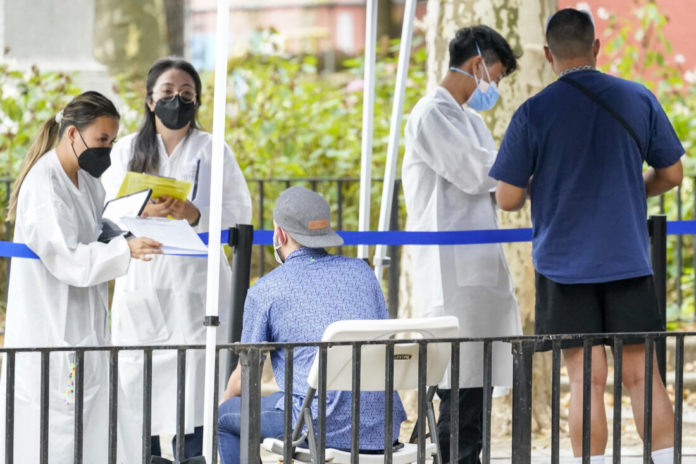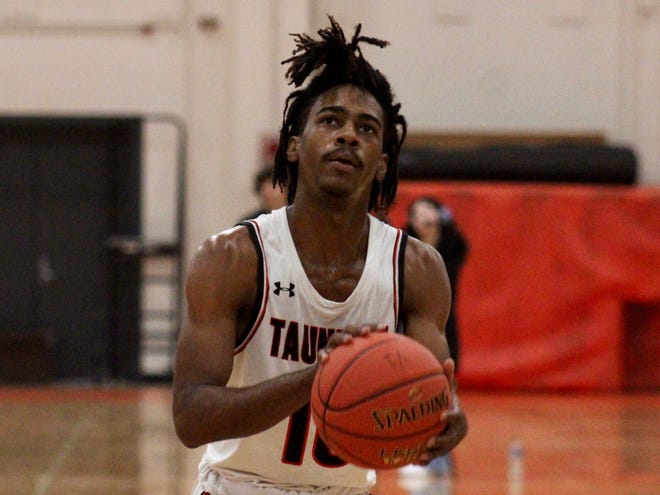
AP PHOTO
Healthcare workers with New York City Department of Health and Mental Hygiene help people register for the monkeypox vaccine at one of the City’s vaccination sites on July 26 in New York. U.S. health officials said Thursday that the country’s monkeypox outbreak can still be controlled and eliminated, despite rising case numbers and concerns about limited vaccine supplies in many parts of the country.
<!–
WASHINGTON — Two months after doctors diagnosed the first case of monkeypox in the United States, Congress has yet to hold a hearing, or give any significant attention to the painful and debilitating virus that’s spread to more than 4,600 people.
Public health officials in the Biden administration have held several briefings, expanded testing capacity to nationwide commercial laboratories, distributed more than 200,000 vaccine doses and begun ordering millions more for the national stockpile.
Yet local health leaders are struggling as cases rapidly increase, jumping from 3,500 cases on Tuesday to 4,600 nationwide on Thursday. In New Orleans, one of the top health care providers for the LGBTQ community ran out of vaccine doses this week, the Louisiana Illuminator reported. Florida and Georgia top the list of the states with the most cases.
Only nine cases have been reported in Iowa as of Wednesday, according to the U.S. Centers for Disease Control and Prevention. Iowa reported its first case July 1.
But lawmakers in Congress haven’t given much attention to monkeypox, which is predominantly affecting the LGBTQ community.
No hearings have been held. No press conferences have been dedicated solely to monkeypox. Members of the House and Senate have put out just 15 press releases about the virus.
In the meantime, the number of cases has rapidly increased as public health officials have tried to curb the spread and raise public awareness.
The World Health Organization is so concerned it classified monkeypox a global public health emergency over the weekend and the Biden administration is seriously considering declaring it a public health emergency within the United States.
Briefing requested
Washington Democratic Sen. Patty Murray is one of the few lawmakers to raise concerns about the spread of the virus and vaccine distribution.
Last week, Murray, who chairs the Senate committee tasked with overseeing public health policy as well as a separate panel that funds the nation’s public health infrastructure, sent a letter to Health and Human Services Secretary Xavier Becerra requesting a briefing on monkeypox.
“Various reports indicate challenges at the local level, with some patients and providers stating they do not have the information and resources necessary to understand, test for, or respond to the disease, which is now presenting with uncharacteristic features,” Murray wrote.
“Since the disease spreads through close, intimate contact, some patients are seeking care at sexual health clinics, which are frequently under-resourced despite providing critical services to underserved communities, including the LGBTQ+ community,” she added.
Murray wrote that while HHS “has already taken a number of steps to respond to the domestic monkeypox outbreak, including activating the Centers for Disease Control and Prevention’s Emergency Operations Center, releasing updated guidance and training for health care providers, mobilizing the Laboratory Response Network and working with commercial labs to expand testing capacity, deploying medical countermeasures, and releasing a vaccination strategy for close contacts,” more action is needed.
Murray, however, hasn’t scheduled a public hearing.
“We haven’t set a time for that yet,” Murray said this week. “We don’t have a lot of time before August. We’re pursuing as many ways as we can.”
The U.S. Senate is set to leave Washington, D.C., at the end of next week for its August recess, though that timeline could be extended for work on a reconciliation package. Senators aren’t expected to return to the Capitol until after Labor Day.
The U.S. House is scheduled to depart for a six-week break Friday, though similarly could be called back to work on an assault weapons ban and the reconciliation package.
More attention?
North Carolina Sen. Richard Burr, the top Republican on the Health, Education, Labor and Pensions Committee that Murray chairs, said there needs to be “a lot” more attention on monkeypox within Congress.
When asked if he’d like the committee to hold a hearing, Burr said, “I’d love to have one.”
Missouri Sen. Roy Blunt — the top Republican on the panel that funds HHS, which Murray also chairs — said there isn’t a need for Congress to do more at this time.
“If there’s more that the Congress doesn’t know, or that the administration should have asked for, that would be the time to look into this,” Blunt said. “But I don’t think it’s yet at the point that it should generate a lot of investigative activity or even hearings.”
Blunt didn’t give a number of cases or a threshold that monkeypox would need to reach before it gets more attention from Congress, saying simply that “it has to be a bigger problem than it is right now.”
Blunt added that he met with CDC Director Rochelle Walensky last week in his office and that the two did discuss monkeypox. But he noted that “Congress has not been asked to specifically do anything yet.”
“And the spread in our country is very minimal still,” Blunt said. “I’m ready for any more input from the administration as to what they’d like to see Congress do.”
New Jersey Rep. Frank Pallone, chair of the House Energy and Commerce Committee, which has jurisdiction over health care, said he doesn’t think Congress necessarily needs to hold hearings on monkeypox.
“I certainly think we could use more awareness, but there are various ways of getting the word out,” Pallone said. “I don’t know if a hearing per se is necessary.”
Rep. Rosa DeLauro, chair of the House Appropriations Committee and the subcommittee that funds HHS, said she thinks “there’s plenty of congressional attention” on the virus.
If the Biden administration needs additional funding to address monkeypox, DeLauro, D-Conn., said, they should send that supplemental spending request to Congress.
So far, Biden officials have not indicated HHS or any other agencies need emergency funding from Congress to address tracking the virus or distributing vaccines.
The White House did ask U.S. lawmakers back in March to approve $22.5 billion in emergency funding to address the COVID-19 outbreak domestically and abroad. Two bipartisan agreements have since been struck but neither made it to the floor for votes.
Problems for local officials
Local health officials, especially in areas with a significant number of cases, are wrestling with vaccine distribution.
In the District of Columbia, with a population of more 700,000, the number of cases has increased so quickly the local health department was forced to change its vaccination strategy this week.
“Given the rapid increase in cases, and the very limited supply of vaccines, DC Health has decided that the most urgent priority is providing the first doses of vaccine to high-risk residents,” reads a statement from the department.
“This single dose strategy is consistent with the monkeypox vaccine distribution strategies used in the UK and Canada, as well as New York City,” it continued.
The District has the highest per capita case count of any state in the country, though D.C. isn’t a state and its residents don’t have full voting representation in Congress.
In New Orleans, the clinic that ran out of doses does not know when it might be able to resume vaccinations. “At this point, we don’t even know who the other clinics are that have it,” Joe Hui, the clinic’s spokesman, told the Louisiana Illuminator on Tuesday.
Monkeypox was first detected in a Massachusetts man in mid-May before spreading to nearly every state in the country. Case counts totaled 4,639 as of Thursday, but numbers climb drastically every day.
New York, California and Illinois are among those states reporting the most cases. Alaska, Montana, Vermont and Wyoming so far haven’t announced any cases, according to the CDC.
No Americans have died so far from the virus that can include chills, exhaustion, fever, headache, muscle aches and swollen lymph nodes. Monkeypox often also comes with a rash that can look like pimples or blisters, according to the CDC.
The virus is spread through direct physical contact with someone who has the rash or lesions on their body as well as through respiratory droplets during prolonged, close contact, or contact with items like bedding or towels that someone with the rash has used.
The current outbreak of monkeypox in the United States, Europe and other countries that don’t traditionally experience the virus, is predominantly occurring in gay or bisexual people, or men who have sex with men, according to public health officials.
Other public health issues
While Congress hasn’t yet given much attention to monkeypox, U.S. lawmakers regularly hold hearings on public health issues, before they reach a certain threshold.
The first U.S. Senate briefing on COVID-19 took place on Jan, 24, 2020 for about two dozen lawmakers.
At the time, there were two cases within the United States and the CDC was saying the threat to the public was low.
But the closed-door briefing included several high-ranking officials, including the CDC director, the Health and Human Services assistant secretary for preparedness and response and National Institute of Allergy and Infectious Diseases Director Anthony Fauci.
The case count in China at the time was about 800 infections and at least 26 deaths.
At the moment, there are nearly 21,000 monkeypox cases in 77 different countries, according to the CDC.
The United States topped the list of the most cases as of Thursday, followed by Spain, Germany, the United Kingdom and France.








